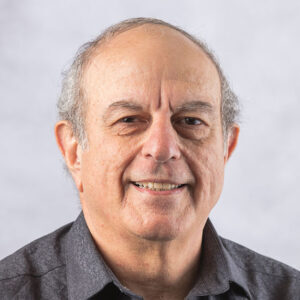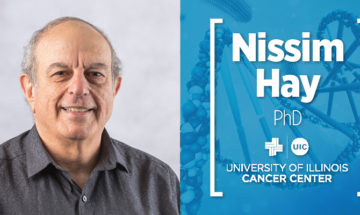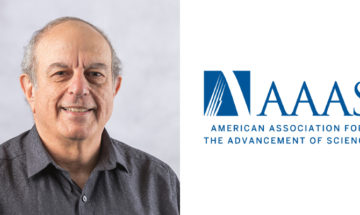Nissim Hay, PhD, is Associate Director of Basic Science at the University of Illinois Cancer Center and a Distinguished Professor in the Department of Biochemistry and Molecular Genetics at the University of Illinois College of Medicine Chicago. His laboratory laid the groundwork for the role the serine/threonine kinase Akt as the major downstream effector of growth factor mediated cell survival. The laboratory showed for the first time that Akt is sufficient and required for the activation of mTORC1 by growth factors. In 2001, his lab described the phenotype of Akt1-/- mice and showed for the first time that genetic ablation of Akt sensitizes cells to cell death. Over the years, his laboratory has been delineating the mechanisms by which Akt affects tumorigenesis and metabolism, both at the cellular and organismal levels. At the organismal level his laboratory generated individual and compound Akt isoforms KO mice, and characterized their phenotypes and their susceptibility to cancer and diabetes. Other high impact discoveries include: (1) Showing that the ability of Akt to promote cell survival is dependent on the binding of mitochondrial hexokinase to mitochondria. (2) Finding the Achilles heel of Akt to overcome cell survival and chemoresistance of cancer cells (2008). (3) Finding a new activity of AMPK as a regulator of NADPH homeostasis and the survival of cancer cells in response to energetic stress. (4) Finding the mechanism by which Akt is required for adipogenesis. (5) Providing genetic proof of concept that hexokinase 2 could be a feasible target for cancer therapy. (6) Showing for that systemic deletion of Akt1 after tumor detection regresses tumors that are not driven by Akt activation. (7) Showing that systemic deletion of both Akt1 and Akt2 in adult mice elicits rapid mortality, and that surprisingly hepatic deletion of Akt1 and Akt2 induces HCC with complete penetrance. His research is focused on serine/threonine kinase Akt, as well as, how Akt affects tumorigenesis and metabolism. Much of his research is found through studying mice.

Nissim Hay, PhD
Professor
Department of Biochemistry and Molecular Genetics
University of Illinois College of Medicine Chicago
Research Program
Cancer Biology (CB)
Phone: 312-355-1684
Email: [email protected]


